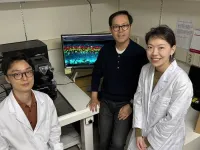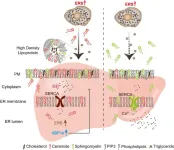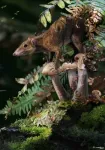(Press-News.org) Scientists should experiment with creative ways of communicating their work to inspire action to protect the natural world, researchers say.
Scientists primarily publish their work in academic journals, where writing is expected to be technical, objective and dispassionate – making it unlikely to appeal to, or be easily understood by non-experts.
The researchers – from the University of Exeter – argue for science “translated into stories”, with benefits both for science and wider society.
They suggest ways that scientists can tell powerful, passionate stories without compromising the objectivity of science.
“As environmental scientists ourselves, we feel frustration, a sense of loss, fear and sometimes helplessness at the lack of action to protect the planet,” said Professor Karen Anderson, from the Environment and Sustainability Institute on Exeter’s Penryn Campus in Cornwall.
“But researchers are expected to be rational – not emotional – for fear of being seen as less objective and trustworthy.
“This prevents scientists from using their knowledge, passion and creative skills to fully communicate the work.”
Dr Katherine Crichton said the current method of academic writing emerged in the 17th and 18th centuries, with “gentleman scientists” writing for each other.
“That form of writing clearly has its place – but we’re not only debating technical aspects of science for academic interest,” Dr Crichton said.
“Everybody should be interested in the climate and biodiversity crisis – we are talking about our home, and that subject is too important to be confined to academic journals.”
Professor Angela Gallego-Sala, an expert in peatlands, added: “We study these ecosystems because we love them – but we are expected to be removed from our subjects.
“In almost all communication of our work, the scientist remains ‘masked’ – a dispassionate source of data and analysis.
“In fact, as scientists we all have stories to tell about ourselves, the people we work with and the places we work in – and these stories could be vitally important.”
The researchers propose ways to communicate environmental science that would appeal to humans – or “storytelling chimpanzees”, as the author Sir Terry Pratchett described us.
These methods include embracing the “art of storytelling”, with platforms for publication alongside traditional scientific writing.
They also argue that scientists should share the “hidden” side of their work: how things are done behind the scenes (as in nature documentaries, such as “into the blue” at the end of each episode of Blue Planet II).
And they encourage scientists to try new ways of “feeding science into normal human life” – for example, author biographies that go beyond factual CVs, enabling authors to share personal stories, motivations and connections to their subjects.
Dr Crichton said: “Existing methods of communication haven’t worked: the destruction of our climate and the natural world continues.
“We need to try something different.
“Humans are inspired by stories. By telling better stories, scientists can help inspire meaningful action to protect ourselves by protecting our environment and the planet.”
Professor Anderson concluded: “There is plenty of other academic work that advocates for scientific storytelling.
“The problem is that these other pieces don’t demonstrate how this can be done.
“Our piece tries to showcase different ways that scientists can experiment with more creative communication methods.
“We understand that it might feel strange to do this, but we hope that other scientists are willing to give this a try.
“It’s the start of a different type of experiment – an experiment with stories.”
The paper, published in the journal People and Nature, is entitled: “We are storytelling apes: experimenting with new scientific narratives in a time of climate and biodiversity collapse.”
END
Science ‘storytelling’ urgently needed amid climate and biodiversity crisis
2025-04-02
ELSE PRESS RELEASES FROM THIS DATE:
KAIST Develops Retinal Therapy to Restore Lost Vision
2025-04-02
Vision is one of the most crucial human senses, yet over 300 million people worldwide are at risk of vision loss due to various retinal diseases. While recent advancements in retinal disease treatments have successfully slowed disease progression, no effective therapy has been developed to restore already lost vision—until now. KAIST researchers have successfully developed a novel drug to restore vision.
< Photo 1. (From left) Ph.D. candidate Museong Kim, Professor ...
Adipocyte-hepatocyte signaling mechanism uncovered in endoplasmic reticulum stress response
2025-04-02
The endoplasmic reticulum (ER) is the portion of the cell responsible for manufacturing and folding proteins. Proteins are essential for a wide range of cellular functions—as enzymes, transporters, hormones, antibodies, receptors, and more. They must be folded into the correct three-dimensional shape to function properly. If the ER is unable to manufacture or fold proteins correctly, the cell develops ER stress, which activates the unfolded protein response (UPR)—a protective mechanism aimed at restoring cellular function.
While UPR begins ...
Mammals were adapting from life in the trees to living on the ground before dinosaur-killing asteroid
2025-04-02
More mammals were living on the ground several million years before the mass extinction event that wiped out the dinosaurs, new research led by the University of Bristol has revealed.
The study, published today in the journal Palaeontology, provides fresh evidence that many mammals were already shifting toward a more ground-based lifestyle leading up to the asteroid’s impact.
By analysing small-fossilised bone fragments, specifically end of limb bones, from marsupial and placental mammals found in Western North America - the only place with a well-preserved terrestrial fossil record from this time – the team discovered signs that ...
Low LDL cholesterol levels linked to reduced risk of dementia
2025-04-01
People with low levels of low-density lipoprotein cholesterol (LDL-C) in their blood have a lower risk of dementia, including lower risk of Alzheimer’s disease related dementia, shows a study published online today in the Journal of Neurology Neurosurgery & Psychiatry.
Use of statins conveyed an additional protective effect for people with low LDL-C, specifically those with blood levels less than 1.8 mmol/L (<70 mg/dL), reducing their risk of dementia even further.
However, reducing LDL-C ...
Thickening of the eye’s retina associated with greater risk and severity of postoperative delirium in older patients
2025-04-01
Thickening of the macular layer of the eye’s retina is associated with a greater risk of postoperative delirium for older patients undergoing surgery under general anaesthetic, reveals a study published online in the open access journal General Psychiatry.
Postoperative delirium is one of the most common complications for older patients after surgery and can have profound implications for long-term health and wellbeing.
Patients with postoperative delirium require longer hospital stays and are more likely to require support at home to help with daily tasks such as washing, dressing, and eating or be discharged ...
Almost one in ten people surveyed report having been harmed by the NHS in the last three years
2025-04-01
Almost one in ten people in Great Britain experienced healthcare-related harm due to care or treatment they received from the National Health Service (NHS) or difficulties accessing care in the last three years, show the findings of a large population survey published in the journal BMJ Quality & Safety.
In more than eight out of ten cases, the harm had a moderate or severe impact on the respondent. Disadvantaged groups, including people with disabilities, long term conditions and those in lower socioeconomic groups, were ...
Enhancing light control with complex frequency excitations
2025-04-01
NEW YORK, April 1, 2025 — Researchers at the Advanced Science Research Center at the CUNY Graduate Center (CUNY ASRC) and at Florida International University report in the journal Science their insights on the emerging field of complex frequencies excitations, a recently introduced scheme to control light, sound and other wave phenomena beyond conventional limits. Based on this approach, they outline opportunities that advance fundamental understanding of wave-matter interactions and usher wave-based technologies into a new era.
In conventional light wave- and sound wave- based systems such as wireless cell phone technologies, microscopes, speakers ...
New research finds novel drug target for acute myeloid leukemia, bringing hope for cancer patients
2025-04-01
A team of scientists from The University of Texas Health Science Center at San Antonio (UT Health San Antonio) has identified a promising new drug target for acute myeloid leukemia (AML), a deadly blood cancer with a five-year survival rate of just 30%, according to the National Cancer Institute. Their study, published in Cell Stem Cell in February, highlights the crucial role of a protein called paraspeckle component 1 (PSPC1) in the progression of AML.
An aggressive blood cancer, AML originates ...
New insight into factors associated with a common disease among dogs and humans
2025-04-01
The pathogens Giardia duodenalis and Cryptosporidium are common causes of sometimes-fatal intestinal diseases in humans, other mammals and birds worldwide.
Now, findings from researchers at Texas A&M University provide new, evidence-based insight into minimizing the risk of these diseases at canine facilities.
“In adult, healthy humans and animals, these diseases usually cause diarrhea and occasionally other minor ailments, but for infants, puppies and the immunocompromised, infection could be deadly,” said Loni Taylor, PhD, DVM, an epidemiologist with the Texas A&M University School of Public Health, who led ...
Illuminating single atoms for sustainable propylene production
2025-04-01
More than 150 million metric tons of propylene are produced annually, making it one of the most widespread chemicals used in the chemical industry.
Propylene is the basis for polypropylene, a polymer used in everything from medical devices to packaging to household goods. But most propylene is produced through steam cracking, a high-energy process that uses heat to break down crude oil into smaller hydrocarbons.
Now, Northwestern University chemists have found a way to create propylene using light. Their findings show that a nanoengineered photoactive ...


